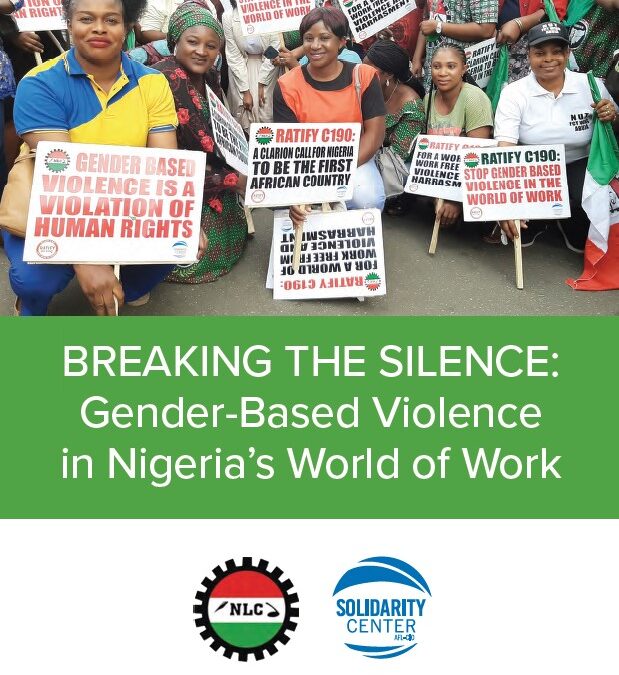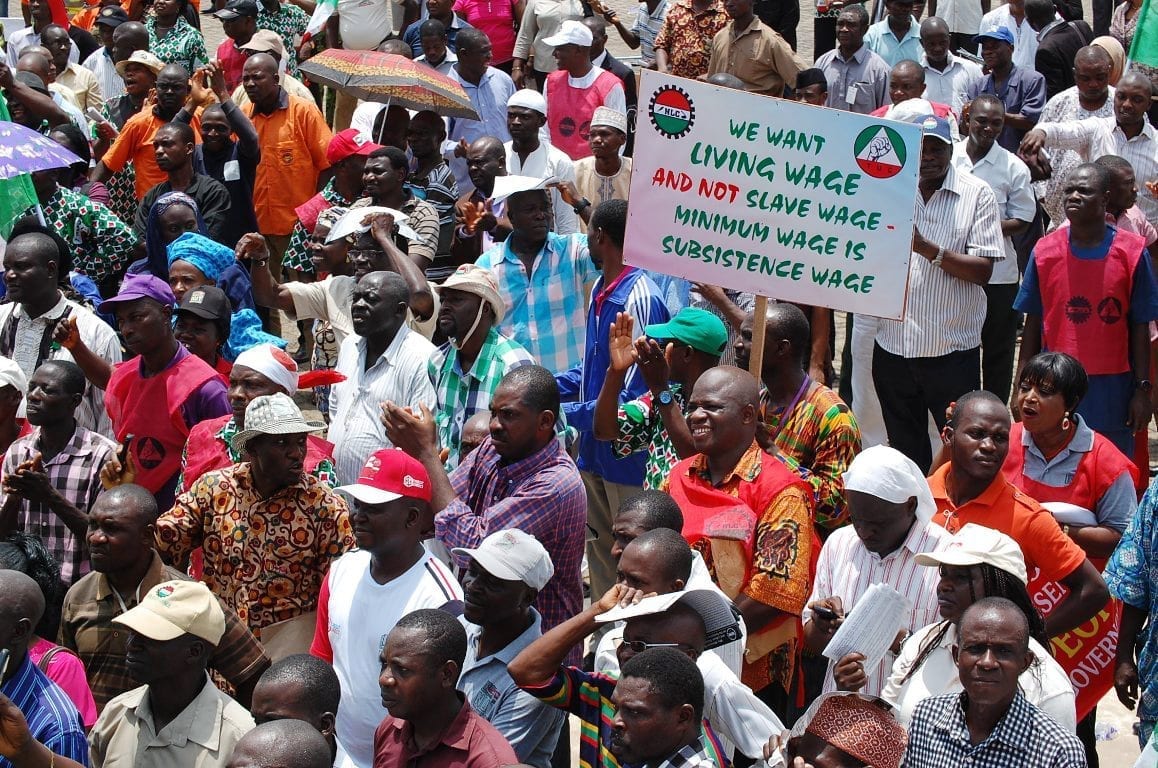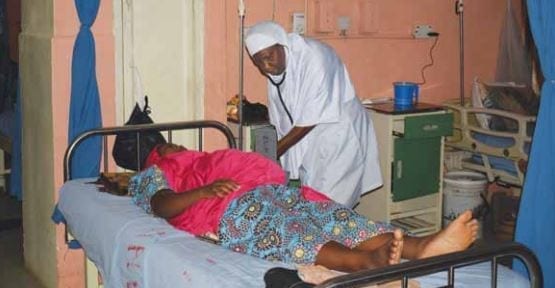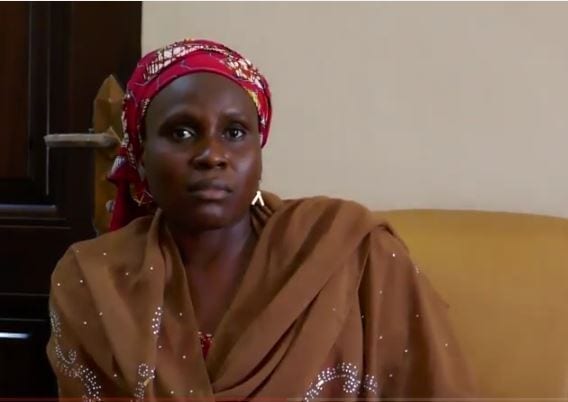
Nov 3, 2021
An alarming 57.5 percent of women workers interviewed across all sectors for this Nigeria Labor Congress (NLC) report say they experienced gender-based violence and harassment (GBVH) in the world of work. More than one-third of respondents said that even when violations were reported, justice was rarely upheld.
Download here.

Sep 23, 2018
Nigeria’s labor federations—the Nigeria Labor Congress (NLC), the Trade Union Congress (TUC) and the United Labor Congress of Nigeria (ULC)—called for a national strike starting at midnight last night to protest stalled negotiations with the government for an increased minimum wage for all workers in the country.
Should the strike continue, all public-sector institutions, including schools and hospitals, could be affected. The strike might involve as many as 4 million workers, including Nigeria’s two oil unions, said Peter Ozo Eson, an NLC spokesperson.
“[W]orkers across the country are angry,” said Iboro Ibara, NLC vice chairman in Akwa Ibom state.
The country’s current minimum wage—$49.60 per month—is not a living wage, say workers, and must be raised to compensate for increased commodity, gasoline and other cost of living increases due to hyperinflation.
The NLC called for a strike starting at midnight last night by “workers from all sectors of the economy and our civil society allies” to pressure the federal government to reconvene the country’s tripartite minimum wage committee. The committee meets so that workers, government and employers can consult on Nigeria’s national minimum wage. The strike was triggered when the government allowed labor’s 14-day ultimatum to reconvene the committee to elapse today.
“This strike is a direct result of the failure of the minimum wage committee to find a way forward,” said Craig Phelan, director of Solidarity Center programs in Nigeria.
UPDATE: The NLC suspended the nationwide strike yesterday in response to news that the federal government will reconvene the tripartite minimum wage committee this week, on October 4 and 5. The NLC credited workers’ “substantial compliance” with the strike for government agreeing to meet.

Sep 6, 2018
A new Solidarity Center report, “Working for Peace in North-East Nigeria: A Challenge for Nigerian Trade Unions,” outlines the devastating toll of Boko Haram violence on people living in northeast Nigeria, in particular on civil servants and their families, and how the labor movement will be essential to responding to the aftermath of the crisis and rebuilding for sustainable development and peace.
The report, with accompanying worker testimonials, was launched Tuesday at a 50-person event in Abuja, Nigeria’s capital. featuring three workers victimized by Boko Haram; Solidarity Center, Borno-based trade union partners; representatives of Nigeria’s National Labor Congress (NLC)—including President Ayuba Wabba; Public Services International (PSI); the Trade Union Congress (TUC); the Organization of Trade Unions of West Africa (OTUWA), as well as the press.
“We have lost more than two thousand workers—teachers, local government workers, health workers,” said Wabba, who pointed to lack of good governance as the root cause of conflict.
“We must work assiduously to try to address issues of human and trade union rights,” he continued.
Three years of sustained work by NLC-affiliated public-sector unions in the region preceded the report’s publication. The unions that represent teachers and hospital workers, among groups specifically targeted by Boko Haram militants, were able to document and begin to address the economic and psycho-social impacts of violence on their members and the community at large. “As integral members of their communities,” the report states, “union members are well-positioned to assess the local situation, understand the needs of community members and communicate this essential information to better facilitate the post-conflict rebuilding process.”
Report recommendations include that the government of Nigeria follow principles established by ILO Recommendation 205 to work in coalition with trade unions and employers in creating long-term solutions for a sustainable and inclusive economy, including bringing back family-sustaining jobs and helping institutions such as schools and hospitals recover and rebuild.

Jun 30, 2017
This week the Nigeria Labor Congress (NLC) and the Trade Union Congress of Nigeria (TUC)—which together represent millions of workers—along with civil-society organizations, presented a joint statement rejecting the “hate campaigns” that calling for secession in the northern part of the country. “We Are One for Nigeria,” they said.
Describing themselves as a pan-Nigeria force rejecting the drumbeats of war, the unions and civil society groups issuing the statement said that a physical conflict would, “hurt us all, most particularly workers” and that a divided Nigeria does not serve workers. The statement went on to call on all Nigerians of any faith, political bent, gender and ethnicity to, “stand up with one voice and fight those promoting division.”
The workers’ statement came in response to rising political tensions in the country, after a coalition of activist groups in northern Nigeria, known as the Northern Youth Groups, demanded that all members of the one of Nigeria’s main ethnic groups, the Igbo, leave northern Nigeria within three months or face forced expulsion. For some Nigerians, calls for secession are reminiscent of the bloody Nigerian civil war a half century ago, during which at least 1 million people died.




